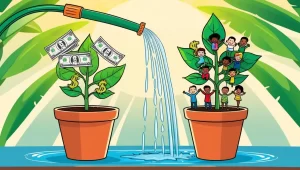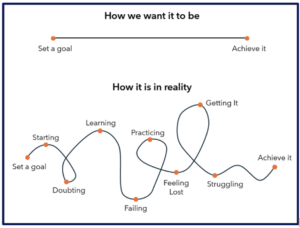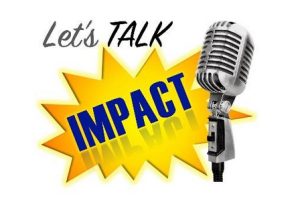Back when things were “normal”, I was flipping through my latest issue of Harvard Business Review (March – April 2020) and was struck by a call out from the article by Stefan Thomke, Building a Culture of Experimentation.
It’s less risky to run a large number of experiments than a small number. If a company only does a handful of experiments in a year, it may have only one success—or none. Then failure is a big deal.
Most of my clients are not-for-profits. They often come to me to ensure success. Yet, I spend most of my energies helping them build capacities and tolerance for “failure.” I found myself thinking, talking about cultures of experimentation isn’t new, so why are we having such a hard time making experimentation our reality? What can I do to move us along?
Fast forward to the end of a year where the uncertainty that surrounds us overwhelmed. I asked myself again, what can I do to make uncertainty a little more tolerable so that we can get on with the business of solving problems and fueling change?
I am not a healer in the traditional sense. Nor am I an inventor or distributor of technologies or goods that provide comfort and safety. I am an evaluator (in fact, my role is sometimes to make people more uncomfortable, not less). I ask questions all day long. I ask my clients to challenge their assumptions and think differently about the work they are doing. I hold them accountable for the change they want to make. I am the last person someone might think of to offer structure and stability in uncertainty.
But wait…
Evaluators bring tools to help us organize decision-making and create structure out of chaos. At Evaluation Plus, uncertainty is where we thrive—we help the world’s problem-solvers fuel change amidst a lot of unknowns.
Every leader in every type of organization is confronted with the reality of making many decisions that will lead them to a new place. Every organization will change. This means every organization needs to experiment and “fail” to succeed.
This is where Evaluation Plus can contribute…
Traditionally, organization-based planning and decision-making tend to meander through a process that uses the most current models of project management and performance tracking. These tools serve us well when we can control the conditions that sit outside of our work and when our teams are functioning at their highest capacity. This is rarely the case. In our work, we use adaptive planning tools that leverage context and rely on rapid collection of multiple types of evidence to inform the best possible decisions. This approach makes the most of traditional organization-based planning and decision-making by adding a proactive and intentional method for experimenting that allows organizations to quickly learn from failures and move on. Think speed bump, not sinkhole.
Evaluation Plus plans to share the tools we use and our experience with them to give problem-solvers, like you, resources to quickly get at good data to inform decisions and adapt so that you don’t spend more time “failing” than you need to and build capacity for higher functioning teams under stress.
If during this time of uncertainty, you are “failing”—fantastic! The capacity to fail takes curiosity, courage and hope. If you’re not “failing”, it’s time to start, and we can support you.
In the meantime, here is what you can do to be confident your decisions are intentional and proactive and will really solve the problem:
Take a deep breath. It’s been a year with lots of problems to be solved and decisions to be made. You’ve been experimenting whether you intended to or not. Experimentation isn’t meant to be perfect. It’s about finding the best ways to solve problems. Let yourself off the hook for not having done everything right. Know that multiple failures precede every success.
Write down the decisions you did make. Make a note as to whether they felt reactive or proactive. Which of these have the potential to be real changes you may want to make going forward?
Make time to make good decisions. I know this sounds hard when we are the ones responsible for helping others feel safe and secure. But I want to encourage you to think of adaptive planning as necessary time to make good decisions. A lot of good, credible evidence can be gathered in very short periods of time.
Check back with us. We are going to be sharing our tools regularly, but also want to hear from you about how you are using them and how they are working.






